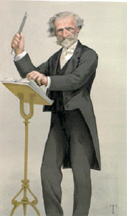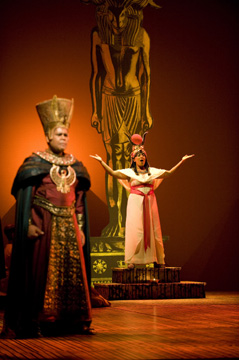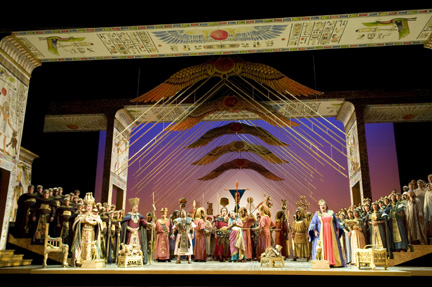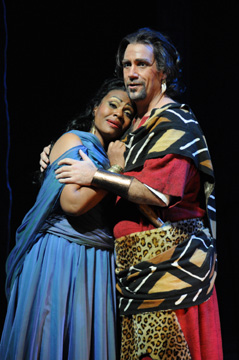Seattle Opera’s AIDA
Delivers a Message
for All Mankind
By Siri Martin
August 2008
 Giuseppe Verdi |
AIDA
Giuseppe Verdi, composer
Antonio Ghislanzoni, librettist
Seattle Opera
August 2-23, 2008
“Man, oppressed by divided cares, and satiated with sensual pleasure, felt an emptiness or want. Man, neither altogether satisfied with the senses, nor forever capable of thought, wanted a middle state, a bridge between the two states, bringing them into harmony. Beauty and aesthetics supplied that for him. But a good lawgiver is not satisfied with discovering the bent of his people—he turns it to account as an instrument for higher use; and hence he chose the stage, as giving nourishment to the soul, without straining it, and uniting the noblest education of the head and heart.”
—Friedrich Schiller, “The Stage as a Moral Institution” (1784)
On November 1, 1869, just days before the opening of the Lincoln inspired Suez Canal, the new Cairo theatre was inaugurated with a performance of Verdi’s Rigoletto. In the following days and months, Verdi was persistently sought by the Viceroy of Egypt, Ismail Pasha, to compose a new opera celebrating the great history of his country. A plot was sent to Verdi written by the Egyptologist Auguste Mariette entitled “La Fiancee du Nil,” which was the seed crystal from which AIDA was born.
The Timeless Virtues of Tragedy
“[T]he pleasure itself, which art provides, becomes a means to morality.”1 Classical tragedy allows one to ponder the similarities and differences between the society on stage and their own. What choices do the characters make that are being made by leaders today? What are the implications for the whole society when the leaders are consumed with their own passions instead of the future of their nation? What is my role as a citizen? All these questions confront the audience of any classical tragedy.
AIDA, one of Verdi’s great tragedies, unfolds many lessons for the thoughtful audience, especially when the production clearly places these lessons before the mind’s eye of the audience. Even more, the lessons embedded within AIDA are universal. Those from any age can identify with the struggle all young adults face between self-centered desires, and desires that put their country or mankind before themselves. One must simply think of Dr. Martin Luther King Jr. or Joan of Arc to find individuals who rose above the tragic scenes of their time. They spoke as if from outside the bounds of prevailing beliefs and behaviors, driving human progress forward with their courageous acts. In addition, any astute student of history knows that the conflicting outlooks of empire vs. republic have determined the organization and, thus, fate of human societies and cultures for the last 2,500 years and more. Therefore, as one watches a society that is gripped by what Lyndon LaRouche has termed ‘the force of tragedy”2 they are led to ponder the greatest question available to the human individual, what principles can I discover that when acted upon will aid in human progress today and beyond?
Verdi the Tragic Poet
Verdi sets AIDA in approximately 1565 B.C., during the rule of Ramses III, ‘the Egypt of the Pharaohs’. This is an historical Egypt of great renown, Ramses III built a network of canals bringing fertility to the land, kept just laws, raised regular taxes, and citizens erected statues of him as if to a semi god. Two centuries later the high priest of Phta didn’t want to put the statue of Darius before that of Ramses III, in Memphis 3.
The opera opens with a new threat to Egypt, coming from the recently conquered and invading Ethiopia. The high priest, Ramfis (Luiz-Ottavio Faria, bass), is bringing the “dread commandment” of the priestess Isis (Priti Gandhi, mezzo-soprano) to the Pharaoh (Joseph Rawley, bass-baritone), determining further war or peace. The young warrior Radames sings about his desire to lead the Egyptian troops into battle to conquer their invaders all with the hope of returning triumphant and in the favor of the Pharaoh and the gods so he can take the captive Ethiopian, Aida (who, unknown to all Egyptians, is the princess of Ethiopia), as his wife. For the astute viewer the ironies abound in the first and second scenes, the great ruler Ramses III, is taking orders that will determine the fate of his kingdom from a priestess and the central character Radames, played by Antonello Palombi (tenor), desires nothing more than conquering the kingdom of the woman he claims to love and use that accomplishment to gain her hand.
At this point the daughter of the pharaoh comes in with the hope that Radames’ sweet song was meant for her. Yet, as Aida walks in the melancholy love theme from the Prelude returns to unsettle the audience’s hope for a calm resolution of the two countries and the lovers. Verdi then carries the audience to the center of the Egyptian court where Radames is declared the general of Egypt’s army and war is declared on Ethiopia, the whole court sings “Egypt shall ne’er be enslaved . . . death to Egypt’s foes.” Aida is left alone on stage struggling between earthly love and love for one’s country. Lisa Daltirus’ (soprano) “Ritorna vincitor” brought all the elements of the first scenes to a point of convergence at which the audience could do nothing but feel pity for this enslaved princess and her struggle to desire more nobly. Act I ends inside the temple of Phta, where one recalls the “dread commandment” just delivered as the priests and priestesses sing of their god, “life giver universal, source of unending love.”
|
Act II begins with Egypt’s princess, Amneris (Stephanie Blythe, mezzo-soprano), surrounded by her retinue, talking about Egypt’s triumph over Ethiopia, and preparing to trick Aida into revealing her love for Radames. As Verdi says Amneris should be ‘driven by the devil’ 4, and this scene allows her vices to shine with full glory. After Amneris claims Radames died in battle Aida can’t hide her double sorrow, for her nation and lost love. At this point, Amneris admits Radames is still alive, but Aida should beware because her rival is the Pharaoh’s daughter! Amneris drags Aida to watch the spectacle of the triumphant march of the conquering Egyptian forces, who are just returning to the palace. Aida’s sorrow turns to shock and
disbelief when she sees her father, the king Ethiopia, among the captives, he tells her not to reveal his identity so he can carry out his planned revenge. Aida begs for mercy for her countrymen.
Radames asks the Pharaoh to grant mercy to the captives, and the ensuing counterpoint that unfolds between the populace and priests, gives the audience insight into the source generating this culture’s ‘force of tragedy’.
The priests sing for the Pharaoh to close his heart and ‘death to all’ while, the populace sings for mercy and for the priests to calm their anger.
|
Verdi’s poetic genius shines as this tragedy naturally grips the audience and pulls them into the culture of ancient Egypt, seeing their nation’s own grandeur and folly mirrored in that far away time. LaRouche clarifies this idea, “[i]n all of the relevant cases, the playwright has crafted a truly dynamic image of a fatal, self-inflicted doom of that society, especially of its panoply of leading figures. The great playwright crafts the drama in such a fashion, that a well-directed, well-acted performance conveys what must be described as a sense of a dynamic principle which envelopes the interaction of the wills of the participating essential characters, a sense of a society which is inflicted, from the top down, with a catastrophic outcome lurking among the reigning social forces of the case . . . Indeed, all the world's a stage! Those relevant characters of the drama interact in ways which foretell their resulting mutual doom. We have, thus, the spectacle of a governing force of a nation, whose actions are committed to effecting their own mutual doom. This set of dynamics is the essential tragedy.”5 From there we are swept through the tragic unfolding of the events of Act III and IV.
Seattle Opera Brings Verdi’s Poetic Genius to Life
|
Speight Jenkins and Seattle Opera created a delightful and powerful experience of Verdi’s AIDA. Conductor, Riccardo Frizza, brought forth Verdi’s composition in all its glory, from the very sweet pianissimo lines of love to the very triumphant and terrifying scenes of religious and military grandeur. Lisa Daltirus and Charles Taylor (Amonasro, baritone) gave honest portrayals of two very challenging characters. It was clear that they used the strength and flexibility of their voices as tools to communicate Verdi’s poetry. The other voices were beautiful, as well, but did not have the vocal transparency and varied palate of color that comes with the emotional commitment that Daltirus and Taylor made. However, I was quite disappointed in the concentration and etiquette of the Seattle audience. It was as if they had no need or desire for the subtleties Verdi created with which to contrast the big and triumphant, from the quiet introduction of the prelude to the captivating musical lines that launch the drama of Act III there was coughing, talking, even a ringing cell phone. Another disappointment was the hedonistic, unhistorical, and unpoetic ballet performances. Thus, pulling one out of ancient Egypt and into modern day western civilization.
On the whole, Seattle residents would definely benefit from experiencing this production of AIDA. It was clear that Seattle Opera was striving to do justice to the genius of Verdi, who has left so many musical dramas for us to learn from. Schiller writes, “the best tragedy is that where the pity excited results more from the treatment of the poet than the theme,”6 and the treatment of the poet was brought forth with much thoughtfulness and honor. Bravo Seattle Opera!
“When melancholy gnaws the heart, when trouble poisons our solitude, when we are disgusted with the world, and a thousand worries oppress us, or when our energies are destroyed by over-exercise, the stage revives us, we dream of another sphere, we recover ourselves, our torpid nature is roused by noble passions, our blood circulates more healthily. The unhappy man forgets his tears in weeping for another. The happy man is calmed, the secure made provident. Effeminate natures are steeled, savages made man, and, as the supreme triumph of nature, men of all clanks, zones, and conditions, emancipated from the chains of conventionality and fashion, fraternize here in the universal sympathy, forget the world, and come nearer to their heavenly destination. The individual shares in the general ecstasy, and his breast has now space for an emotion: he is man.”
—Friedrich Schiller, “The Stage as a Moral Institution”
Related Pages:
Other Music Reviews
The Essence of Being Human in Verdi’s La Traviata (Michigan Opera Theatre)
Prometheus Defeats Zeus at Seattle Opera’s I Puritani
Bellini Comes to Life in Detroit, “La Sonnambula” (Michigan Opera Theatre)
Beauty and Pathos of Mozart Undermined by Dirictor’s Conceit (Los Angeles Opera)“Marriage of Figaro": An Opera for Our Time (Michigan Opera Theatre)
Verdi's Tragedy "The Masked Ball" Brings Joy to Houston Opera Attendees
“Cyrano”: A Romantic Opera Which Begs for the Classical
Los Angeles Opera's Superb "Fidelio" Does Justice to Beethoven
Houston Grand Opera: A Spectacular “AIDA”
Mozart's Don Giovanni from a Houston Opera *
Verdi’s ‘Il Trovatore’: Sublime Love vs. Revenge at the Washington National Opera*
‘Rigoletto’: Verdi’s Education of the Emotions - Michigan Opera Theater **
Verdi’s LaTraviata - The Woman Who Went Astray *
Close to Perfection - Mozart’s Le Nozze di Figaro at Los Angeles Opera **
András Schiff in Concert, Washington, DC, 2003 *
Clemenza di Tito in Dresden, Germany, 2000
Schiller Institute Art, Music and Book Reviews
Footnotes:
1. Friedrich Schiller, “On the Reason Why We Take Pleasure in Tragic Subjects” (1791), Poet of Freedom Vol. 4, Schiller Institute, Inc., 2003.
2. Lyndon LaRouche, “From Shakespeare’s Principle of Tragedy: Ambrose Evans-Pritchard” (Executive Intelligence Review—” EIR, July 11, 2008), “The true force of history lies not in the armed fist, nor in numbers rallied to the cause, but in the commitment by individuals. It lies in the power of ideas whose time has come, now, as in the past.”
“In Classical tragedy, there were so-called gods, like the Olympian Zeus of Aeschylus’ Prometheus Bound, who played with mortal men and women as an evil child plays cruelly with dolls. In Classical Greek, such a system came to be known as the oligarchical model, a model typified by the Babylon of legendary Belshazzar, and by the Persian, Roman, Byzantine, Venetian-Anjou, Venetian-Habsburg, and neo-Venetian, British (Anglo-Dutch Liberal) empires, ..Re.”
3.Hans Busch, “Verdi’s AIDA: The History of an Opera in Letters and Documents,” pg. 476-7, University of Minnesota, 1978.
4. Op. cit
5. Op. cit
6. Friedrich Schiller, “On Tragic Art” (1792), Poet of Freedom Vol. 4, Schiller Institute, Inc., 2003



